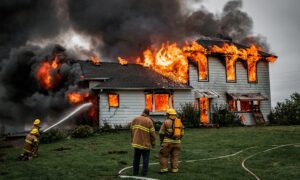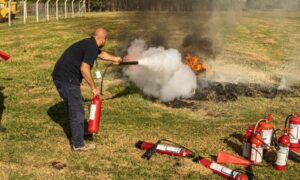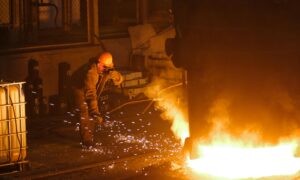Fire safety is a crucial concern for every business, particularly in a bustling, densely populated city like London. As a business owner, ensuring that your premises are compliant with fire safety regulations is not just about protecting your property and employees but also about safeguarding your reputation and meeting legal obligations. A key element in this process is obtaining a Fire Safety Certificate, which signifies that your premises meet the necessary fire safety standards. This certificate is essential for ensuring that your business complies with local fire safety laws and provides peace of mind for both you and your employees. In this guide, we will explain what a Fire Safety Certificate is, why it is important, how to obtain one, and the steps you can take to ensure that your business remains fire-safe and compliant with local regulations.
What is a Fire Safety Certificate?
A fire safety certificate is an official document that confirms that your business premises meet the requirements of the Fire Safety Order (FSO) 2005, also known as the Regulatory Reform (Fire Safety) Order. This piece of legislation applies to all non-domestic properties in England and Wales, including offices, shops, restaurants, warehouses, and more.
The certificate itself acts as proof that a qualified fire safety assessor has inspected your premises and found that your fire safety measures—such as fire alarms, emergency exits, firefighting equipment, and evacuation plans—are up to standard. In some cases, you might be required to display this certificate in your premises, or it may be necessary for your local council or the London Fire Brigade to inspect and issue it as part of their regular safety checks.
The Importance of Fire Safety Certificates for London Businesses
Fire safety is not something that can be overlooked, and having a fire safety certificate can have significant benefits for your business. In London, with its mix of modern buildings and historic structures, fire safety is especially important due to the higher risks posed by densely packed buildings and a large population.
One of the primary reasons for obtaining a fire safety certificate is to ensure compliance with the law. The Regulatory Reform (Fire Safety) Order requires all businesses to carry out fire risk assessments and implement measures to reduce fire hazards. Failure to comply with these regulations can result in fines, legal action, or even the closure of your business.
In addition to meeting legal requirements, a fire safety certificate demonstrates that you take the safety of your employees, customers, and visitors seriously. It also assures your stakeholders, including insurers, that your premises are adequately protected, which may be beneficial when it comes to renewing insurance policies or in the event of an emergency.
Furthermore, in the aftermath of a fire, having a valid fire safety certificate can protect you from liability, showing that you made every effort to ensure safety and minimize risk. This can be crucial in avoiding potential lawsuits or claims for negligence.
How to Obtain a Fire Safety Certificate in London
In London, businesses must follow a few steps to obtain a fire safety certificate. These steps are designed to ensure that your property is thoroughly assessed and meets all necessary fire safety standards. As part of your fire safety responsibilities, it’s essential to ensure that the fire risk assessment is conducted by a competent person and that all identified risks are addressed before applying for the certificate. Regular reviews of fire safety protocols and ensuring that the correct personnel are trained is also a key part of ongoing responsibility.
Fire Risk Assessment
The first step in obtaining a fire safety certificate is to conduct a comprehensive fire risk assessment. This assessment is a critical part of the process and must be carried out by a competent person. A fire risk assessor will visit your business premises, identify potential fire hazards, assess the likelihood of a fire occurring, and evaluate the potential risks to people in the building.
The risk assessment will cover areas such as fire exits, fire alarms, emergency lighting, fire-resistant materials, and employee training. Based on the findings, the assessor will recommend measures to address any identified hazards, including fire prevention systems, staff evacuation plans, or the installation of fire safety equipment.
Implement Necessary Fire Safety Measures
Once the fire risk assessment has been completed, you will need to implement the recommended fire safety measures. These measures could involve installing or upgrading fire alarms, ensuring that emergency exits are clear and accessible, fitting fire extinguishers in key locations, or making other adjustments to meet fire safety standards.
It’s important to note that fire safety is an ongoing responsibility. Regular checks and maintenance of fire safety equipment, fire alarms, and emergency lighting are essential to keeping your premises compliant with the law and safe from potential hazards.
Fire Safety Inspection
After implementing the necessary measures, the next step is to arrange for a fire safety inspection. In London, this is often carried out by the London Fire Brigade or an independent fire safety professional. The inspector will verify that all recommended fire safety measures are in place and meet the requirements set out by the Fire Safety Order.
If the inspector is satisfied with the safety measures, they will issue your fire safety certificate. This certificate is a valuable document that proves your business is in compliance with fire safety regulations.
Common Fire Safety Requirements for London Businesses
To better understand the importance of a fire safety certificate, it’s helpful to know the key fire safety requirements that businesses in London must comply with. These include:
Fire Detection and Alarm Systems
Your business premises must have an appropriate fire detection and alarm system. This can include smoke detectors, heat detectors, and a fire alarm system that is loud enough to alert all individuals in the building. The system should be tested regularly to ensure its functionality.
Emergency Exits and Evacuation Routes
Clear and accessible emergency exits are a key component of fire safety. Businesses must ensure that their premises have enough exits to accommodate the number of people in the building. Exit routes should be clearly marked, free from obstruction, and well-lit in case of a power outage.
Firefighting Equipment
Your business must have the appropriate fire safety equipment, such as fire extinguishers, fire blankets, and hoses. The equipment should be easily accessible, regularly checked, and maintained to ensure it is in working condition.
Employee Fire Safety Training
Your staff should receive training on fire safety procedures, including how to use fire extinguishers, how to evacuate safely, and how to respond in case of a fire. Regular fire drills should be conducted to ensure everyone knows what to do in an emergency.
Conclusion
Fire safety certificates are an essential aspect of running a business in London. They confirm that your premises meet the legal requirements for fire safety, protecting both your employees and customers. Obtaining and maintaining a fire safety certificate involves conducting a fire risk assessment, implementing necessary safety measures, and ensuring ongoing compliance with fire safety laws.
Beyond legal compliance, a fire safety certificate can enhance your business’s reputation, help you maintain insurance coverage, and most importantly, provide peace of mind that you have taken the necessary steps to protect your business from the devastating effects of fire. By prioritizing fire safety, London businesses can contribute to the safety and well-being of everyone in the workplace while ensuring the continued success and longevity of their operations.If you want to stay updated with posts like this, please follow us on Techbullion.



































